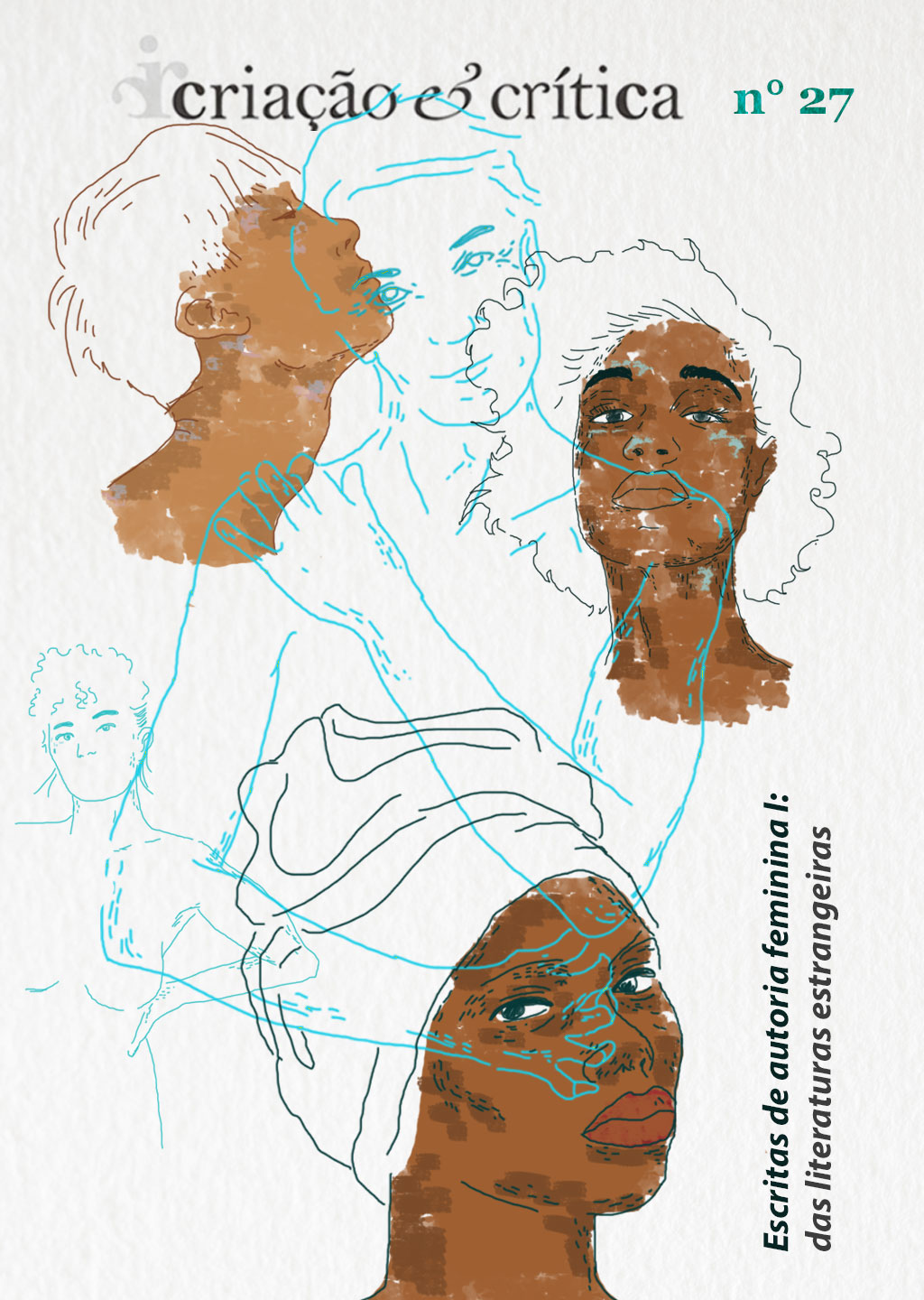To narrate is to articulate lost time and space: gender violence and trauma in Troubling Love by Elena Ferrante
DOI:
https://doi.org/10.11606/issn.1984-1124.i27p264-284Keywords:
Gender violence, Trauma, Sexual abuse, Elena Ferrante, Troubling Love, PsychoanalysisAbstract
In the present article, we aim to put on view how the novel Troubling Love, by Elena Ferrante, is impinged by a sexual abuse that affects the relationship of a daughter and her mother. To the extent that it conveys gender violence, this happening presents itself as a cultural blind spot, shaping itself as traumatic. By the end of the book, after reconstructing the story of her mother, it is possible for the narrator, Delia, to remember the abuse she suffered as a child, signifying episodes of her past that manifested themselves as a malaise. The 'troubling' in the title, which epitomises the mother-daughter relationship, permeates the plot resonating the troubling of the violence only unveiled by the end of the novel. Our theoretical take is supported by the considerations of Shoshana Felman on literature, testimony and cultural trauma. With the intent to link trauma and gender violence, we revisit Sigmund Freud's perspective on the theme, as well as the contemporary discussions, through Cathy Caruth and Gayle Rubin. Thus, we argue that Elena Ferrante's novel allows to a breaking through in the possibilities of narrating sexual abuse and gender violence traumas, as cultural blind spots.
Downloads
References
ALMADA, S. Garotas mortas. São Paulo: Todavia, 2018.
BORDO, S. “O corpo e a reprodução da feminilidade: uma apropriação feminista de Foucault”. In: BORDO, Susan e JAGGAR, Alison (Org.). Gênero, corpo e conhecimento. Rio de Janeiro: Rosa dos Tempos, 1997.
BROWN, L. “Not outside the range: one feminist perspective on psychic trauma”. In: CARUTH, Cathy (Org.) Trauma: explorations in memory. Baltimore: The Johns Hopkins University Press, p. 100-112, 1995.
CARUTH, C. “Introduction”. In: CARUTH, Cathy (Org.) Trauma: explorations in memory. Baltimore: The Johns Hopkins University Press, p. 3-12, 1995.
COSTA, A. Litorais da psicanálise. São Paulo: Escuta, 2015.
FELMAN, S. “Educação e crise, ou as vicissitudes do ensino”. In: NESTROVSKI, A; SELIGMANN-SILVA, M. (Orgs.). Catástrofe e representação: ensaios. São Paulo: Escuta, p. 13-71, 2000.
FELMAN, S. (2014). O inconsciente jurídico: julgamentos e traumas no século XX. São Paulo: EDIPRO, 2014.
FERRANTE, E. Frantumaglia: os caminhos de uma escritora. Rio de Janeiro: Intrínseca, 2017.
FERRANTE, E. Um amor incômodo. Rio de Janeiro: Intrínseca, 2017.
FREUD, S. “Conferência XVIII: Fixação em traumas – o inconsciente”. In: FREUD, S. Obras psicológicas completas de Sigmund Freud: edição standard brasileira, v. XVI. Rio de Janeiro: Imago, p. 281-292, 1996. (Trabalho originalmente publicado em 1917).
FREUD, S. “Além do princípio do prazer”. In: FREUD, S. Obras completas, v. 14. São Paulo: Companhia das Letras, p. 328-376, 2010. (Trabalho originalmente publicado em 1920).
FOLHA INFORMATIVA: VIOLÊNCIA CONTRA AS MULHERES. Opas/OMS Brasil Organização Pan-Americana de Saúde/ Organização Mundial de Saúde, 2017. Disponível em: https://www.paho.org/bra/index.php?option=com_content&view=article&id=5669:folha-informativa-violencia-contra-as-mulheres&Itemid=820. Acesso em 28 de jun. de 2020.
GAGNEBIN, J. M. “Escrita, morte, transmissão”. In: SCOTTI, S. S.; BERGAMASCHI, R. D. B. L; GUIMARÃES, B.; VARGAS, R. F. S. V.; COSTA, A. (Orgs.). Escrita e psicanálise II. Curitiba: Editora CRV, p. 133-144, 2010.
MANZOLINI, N. “Telling the abuse: a feminist-psychoanalytic reading of gender violence, repressed memory, and female subjectivity in Elena Ferrante’s Troubling Love”. In: BULLARO, G. R.; LOVE, S. V. The works of Elena Ferrante: reconfiguring the margins. New York: Italian and Italian American Studies, 2016.
MORAES, E. R. “A escritora genial”. Quatro Cinco Um: A revista dos livros, São Paulo, 01 de mai. de 2017. Disponível em: https://www.quatrocincoum.com.br/br/resenhas/l/a-escritora--genial. Acesso em 28 de jun. de 2020.
POLL, M. M.; ALVES, F. O.; PERRONE, C. M. “Violência de gênero: uma discussão sob a perspectiva do trauma cultural”. Interação em psicologia, v. 22, n. 2, 2018.
RICH, A. On lies, secrets and silence: selected prose. New York: W. W. Norton & Company, 1995.
ROGARTIS, T. Elena Ferrante. Parole Chiave. Roma: Edizioni e/o, 2018.
RUBIN, G. “O tráfico de mulheres”. IN: RUBIN, G. Políticas do sexo. São Paulo: Ubu Editora, 2017.
SHOWALTER, E. “A crítica feminista no território selvagem”. In: HOLLANDA, Heloísa Buarque de (Org.). Tendências e impasses: o feminismo como crítica da cultura. Rio de Janeiro: Rocco, 1994.
WOODS, J. “Women in the verge”. The New Yorker, New York, 21 de jan. de 2013. Disponível em: https://www.newyorker.com/magazine/2013/01/21/women-on-the-verge. Acesso em 28 de jun. de 2020.
Downloads
Published
Issue
Section
License
Copyright (c) 2020 Ana Paula Bellochio Thones, Helena Pillar Kessler, Karla Julliana da Silva Sousa, Lia Aguirre Silveira da Rosa, Tatianne Santos Dantas

This work is licensed under a Creative Commons Attribution-NonCommercial-ShareAlike 4.0 International License.
Authors who publish with this journal agree to the following terms:
- Authors retain copyright and grant the journal right of first publication with the work simultaneously licensed under a Creative Commons Attribution License that allows others to share the work with an acknowledgment of the work's authorship and initial publication in this journal.
- Authors can enter into separate, additional contractual arrangements for the non-exclusive distribution of the journal's published version of the work (e.g., post it to an institutional repository or publish it in a book), with an acknowledgment of its initial publication in this journal.
- Authors are permitted and encouraged to post their work online (e.g., in institutional repositories or on their website) before and during the submission process, as it can lead to productive exchanges, as well as earlier and greater citation of published work (See The Effect of Open Access).



